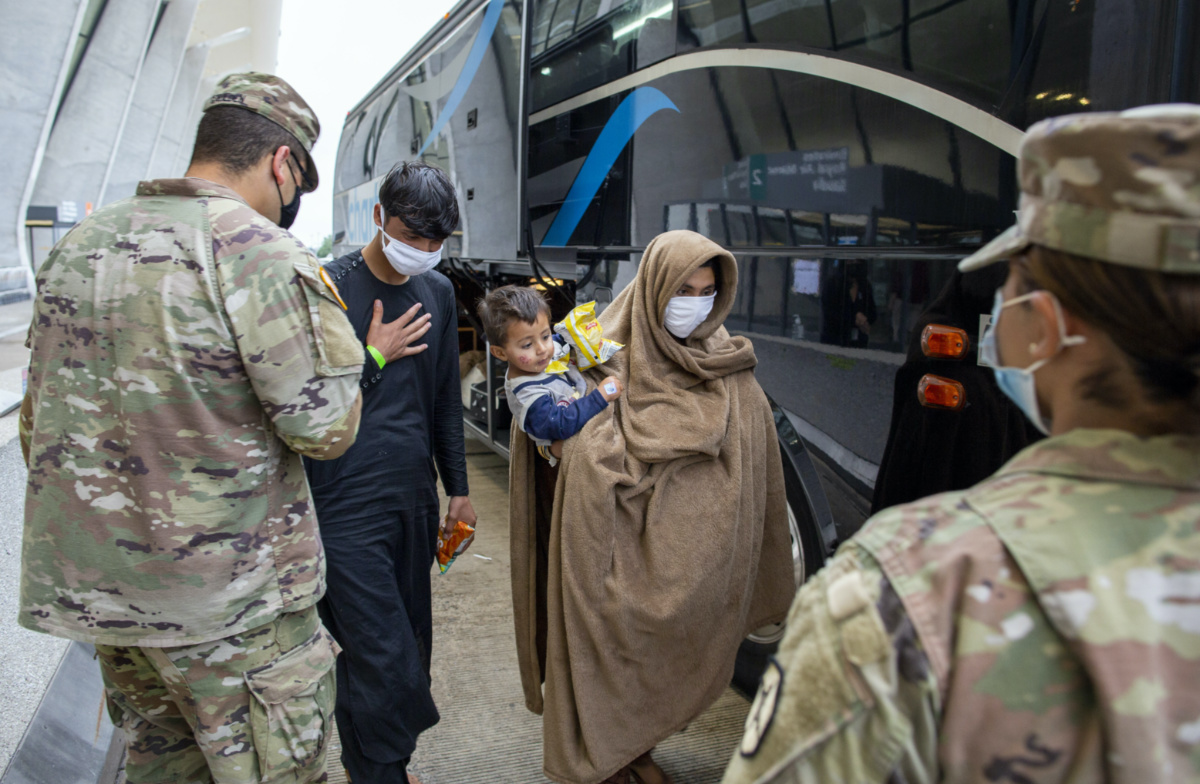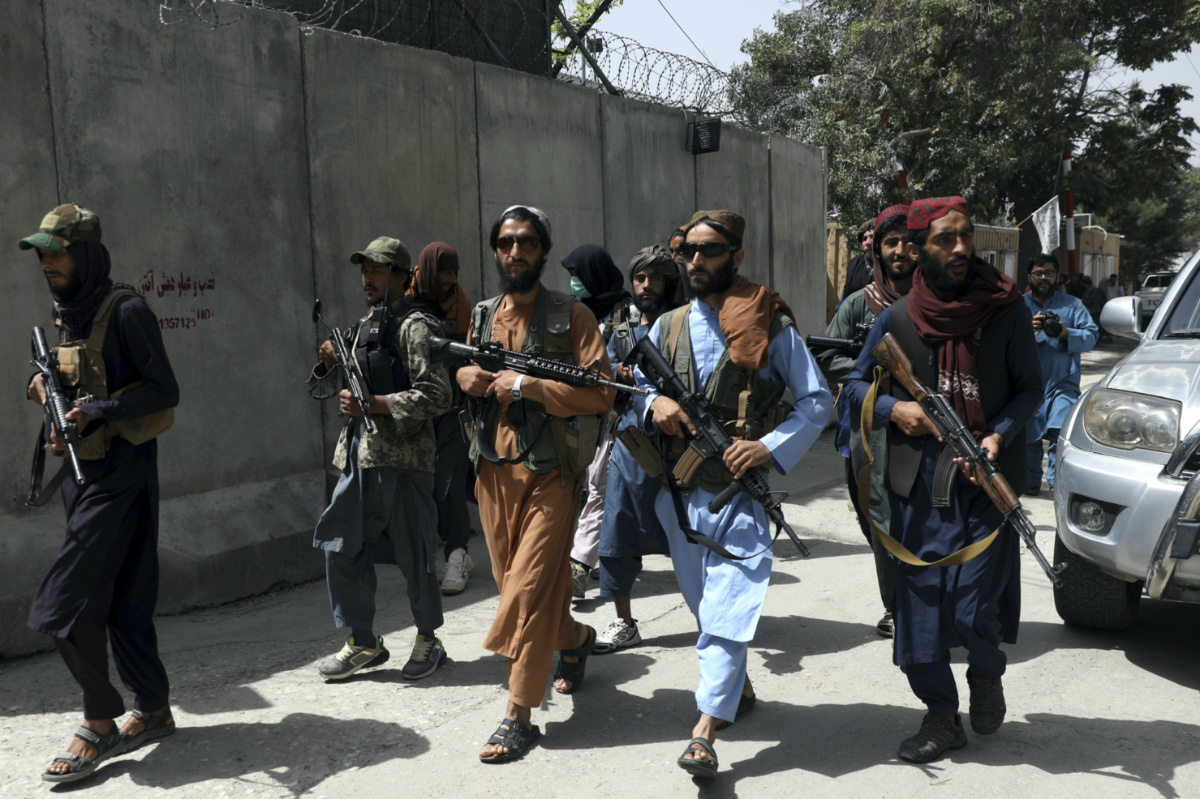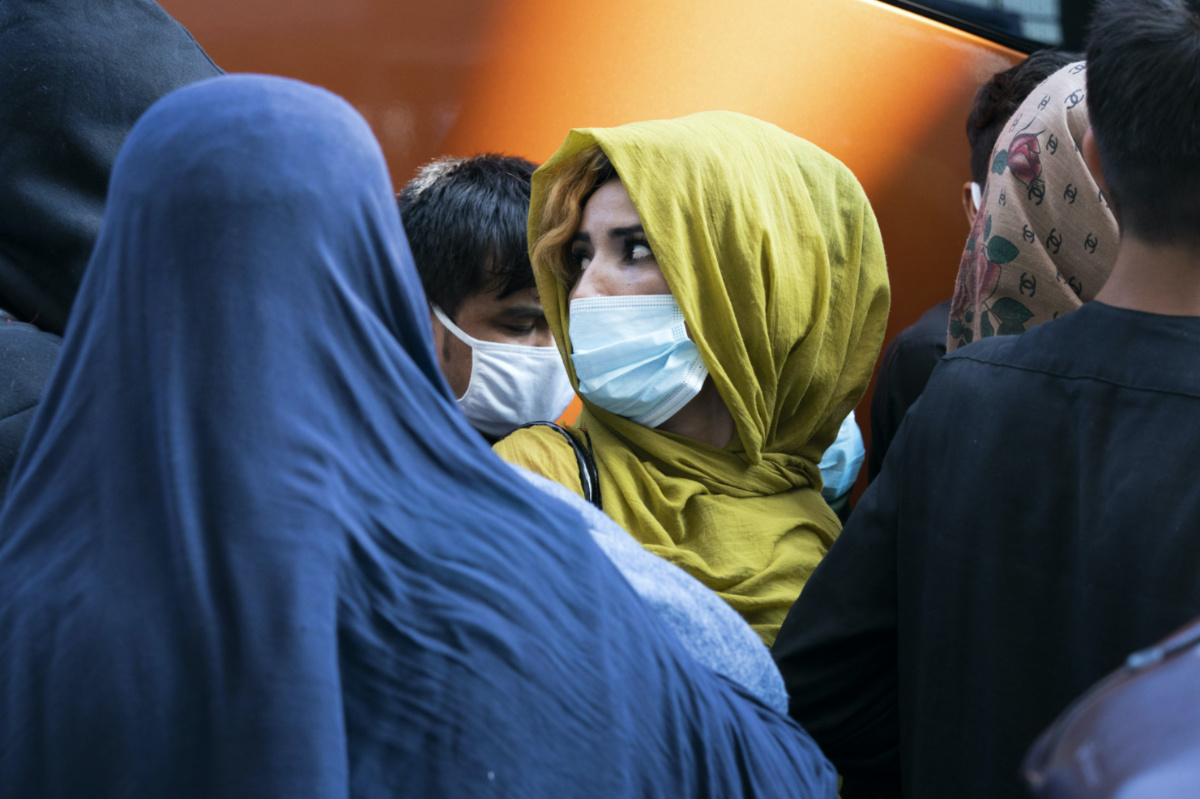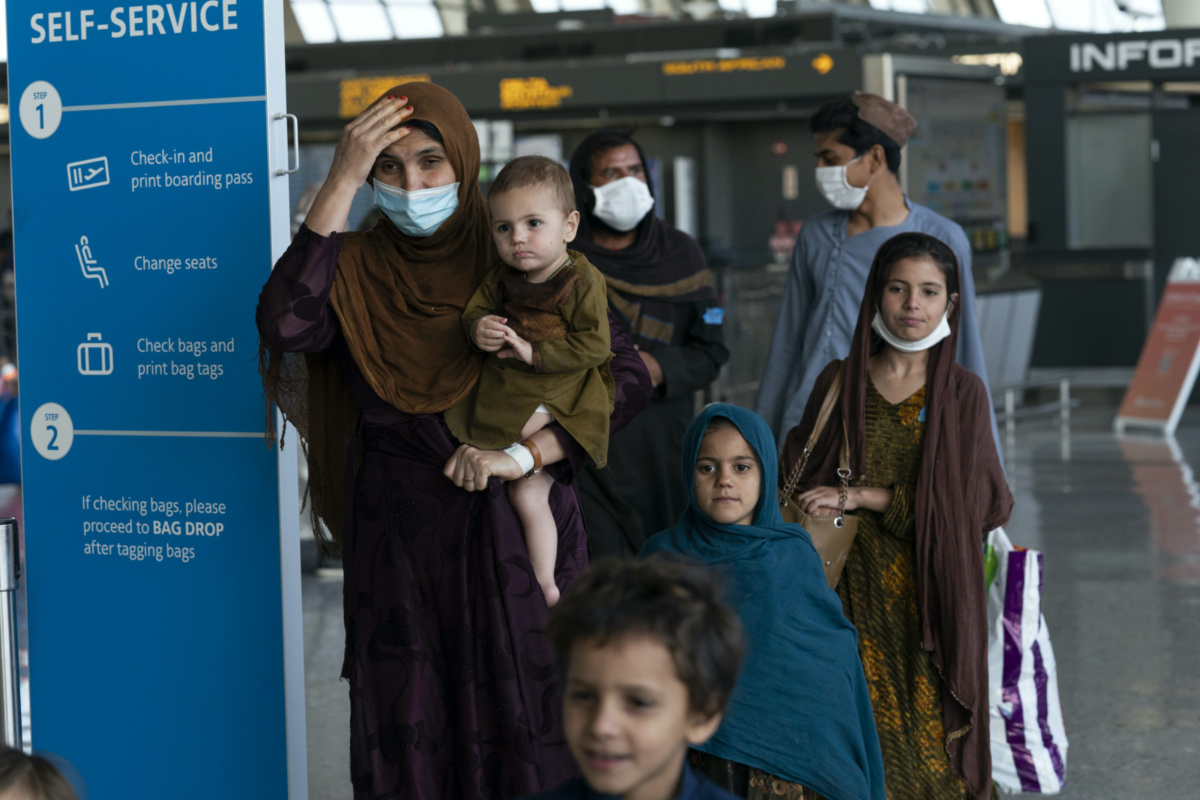
EMILY MCFARLAN MILLER, of Religion News Service, reports on how US faith-based refugee resettlement agencies are helping Afghan evacuees settle into their new homes stateside as well as advocating for those left behind…
Mustafa was back in Afghanistan visiting his wife and daughter when the Taliban literally moved in next door. He knew they had to get out of the country immediately.
But this time, he said, he wasn’t leaving without his wife and daughter.

A man evacuated from Kabul, Afghanistan, and a US service member greet each other at Washington Dulles International Airport, in Chantilly, Virginia, on Wednesday, 1st September. PICTURE: AP Photo/Gemunu Amarasinghe/File photo.
That harrowing journey would take them two days just to get into the airport in Kabul; another two, to finally board a plane. It would span three countries, with a stop in Qatar on their way from Afghanistan to the United States. It would also mean a heartbreaking goodbye to parents, siblings and their families.
Mustafa, who has asked to be identified only by his first name, still considers his family one of the lucky ones, able to flee Afghanistan before the 31st August cutoff for the withdrawal of US armed forces and allies from the country.
“We remember the thousands of lives lost in the conflict in Afghanistan, including American service members, Afghan civilians, and others. But the mission is not complete.”
– Jenny Yang, senior vice president of advocacy and policy at World Relief.
Now faith-based refugee resettlement agencies are helping people like Mustafa and their families to settle into their new homes in the US and advocating for those left behind.
“We remember the thousands of lives lost in the conflict in Afghanistan, including American service members, Afghan civilians, and others. But the mission is not complete,” said Jenny Yang, senior vice president of advocacy and policy at World Relief, the evangelical Christian relief organisation that assisted Mustafa when he immigrated by himself to the US in 2017.
“The United States and the international community must do the hard work now of protecting and assisting those who cannot remain in Afghanistan safely.”
Mustafa, now 29, never wanted to leave Afghanistan, his family, his education or the small media company he founded with his brother. But after working as an interpreter and analyst for America and other international organisations, he’d received both direct and indirect threats against his life from the Taliban.
There were frequent clashes between the Afghan Government and the Taliban, he said.
“All I remember in Afghanistan was war. I was born in war, raised in war, grew up in war. Part of my education was under the Taliban system a long time ago,” he said.
“When we are leaving our home in the morning, we don’t believe that we will come back alive in the evening.”

Taliban fighters patrol in Wazir Akbar Khan neighbourhood in the city of Kabul, Afghanistan, on Wednesday, 18th August. PICTURE: P Photo/Rahmat Gul.
At the time, Mustafa said, the process of getting a Special Immigrant Visa, designed for Afghans who were employed by or on behalf of the US Government, was relatively quick and easy.
Not sure what to expect in the US, he came alone in 2017, thinking his wife could join him in a few months once he had settled into the country. But the process “changed completely” after former President Donald Trump took office, Mustafa said, and her application was denied.
He had started the process over and was visiting his wife and one-year-old daughter in Kabul when the Taliban seized power several weeks ago. It was unexpected, he said. He never heard a single shot fired in the city.
When members of the Taliban began sheltering in front of their house, Mustafa, his wife and daughter went to stay with a friend who lived near the airport. He tried not to be afraid, he said, focusing instead on doing what he could to help his family.
He spent a day trying to get inside the airport, along with his brother and brother-in-law, who already were in the middle of the SIV process, and his father, who previously had worked with the British Embassy. But the scene outside the airport was crowded, chaotic and punctuated by gunfire meant to control the crowd, and he returned to his friend’s house that night, unable to get inside.
The next day, Mustafa made the difficult decision to part ways with his parents and siblings, telling his father he’d do all he could to get him out of Afghanistan once he had left. He couldn’t lose the chance to get his wife and daughter out of the country, he said.
When he secured emergency visas for his wife and daughter and was told they could come with him, “that was the most beautiful moment of the story,” he said.
Once the trio made it inside, they spent two nights sleeping in the airport before they were able to board a packed military plane bound for Qatar in the wee hours of the morning.
After waiting seven hours on a hot tarmac for transportation to a shelter in Qatar, they boarded a second flight to Washington, DC. They slept through the 14-hour flight, exhausted after their dayslong ordeal, and arrived on 21st August in the US, he said.
On 30th August, as the deadline for US withdrawal closed in, his brother and brother-in-law still were waiting on a phone call from the US Embassy telling them to come to the airport, he told Religion News Service.
“There are lots of other people like my family,” he said.

Families evacuated from Kabul, Afghanistan, wait to board a bus after they arrived at Washington Dulles International Airport, in Chantilly, Virginia, on Wednesday, 25th August. PICTURE: AP Photo/Jose Luis Magana/File photo.
Faith-based refugee resettlement organisations – many of which urged the Biden administration months ago to begin evacuating Afghan allies before its planned troop withdrawal – have continued to advocate for those like Mustafa’s family who have been left behind.
World Relief has resettled about 6,300 individuals with Special Immigrant Visas in the last five years and has a lot of relationships with Afghans in the US, according to Matthew Soerens, US director of church mobilisation for World Relief. Almost all have reached out to the organisation in recent days “desperately concerned” for someone who is still in Afghanistan, he said.
“We are not moving past the reality that for the many who got out, who are starting to arrive, many others did not get out, including people who had pending Special Immigrant Visa applications because of their service to the US military or other parts of the US Government…We do not consider that acceptable,” Soerens said.
Advocates aren’t sure what the process will look like to help those people continue to flee Afghanistan, which has become more difficult since the airlift ended. But that’s something the US and other governments need to figure out, he said.
“We are not moving past the reality that for the many who got out, who are starting to arrive, many others did not get out, including people who had pending Special Immigrant Visa applications because of their service to the US military or other parts of the US Government…We do not consider that acceptable.”
– Matthew Soerens, US director of church mobilisation for World Relief.
Organisations like World Relief, which form the backbone of the US refugee resettlement system, also are working to meet the needs of Afghans arriving with SIVs or on humanitarian parole. Department of Homeland Security Secretary Alejandro Mayorkas has said the US expects to welcome 50,000 evacuated Afghans through what it is calling Operation Allies Welcome.
Many remain in third countries undergoing security vetting and screenings before they can be admitted to the US.
Coming to the US in 2017 was a tough decision, Mustafa said, because, “I had to leave everything back in Afghanistan and come back and start everything from scratch in the US.”
But he found a “very welcoming place” in World Relief’s resettlement office in Modesto, California, he said.
The organisation provided classes to help him learn about American culture and all the other things he needed to know about life in the US. He remembers it helping other families to settle into and furnish housing.

Families evacuated from Kabul, Afghanistan, walk through the terminal before boarding a bus after they arrived at Washington Dulles International Airport, in Chantilly, Virginia, on Friday, 27th August. PICTURE: AP Photo/Jose Luis Magana.
Housing remains one of the biggest needs for evacuees arriving without the kind of credit history many landlords require, according to Soerens.
So far, more than 360 Afghan allies, most with SIVs, have arrived at World Relief offices across the country, he said.
The organisation has been told to expect even more people to arrive with humanitarian parole status, he said. Many could have pending SIV cases. Others may be religious or ethnic minorities, women who sought education or people who served non-governmental organisations with American affiliations.
Soerens said he has talked with former Homeland Security officials about the vetting process those evacuees are going through now in third countries. Officials are using the same biographic and biometric tools to vet people they normally would for the refugee resettlement process, he said. If there’s any confusion about who a person is, he or she isn’t brought to the US.
“We want everyone to be thoroughly vetted, and we have a great deal of confidence in the US Government’s ability to vet people appropriately based on a really impressive record of doing so,” he said.
Faith-based agencies are working quickly now to rebuild their capacity after years of cuts to the refugee resettlement program under Trump. They’re also raising funds and advocating for legislation to provide the same assistance to Afghan allies that refugees normally would receive.
And churches have been quick to respond, according to Soerens. As of last week, World Relief’s Chicagoland office received 800 inquiries from people interested in volunteering to help Afghans arriving in the area. In an average month, it receives about 25.
“We’ve been really, really thankful for the just unprecedented support from churches in particular, both in terms of financial support and volunteers,” Soerens said.





